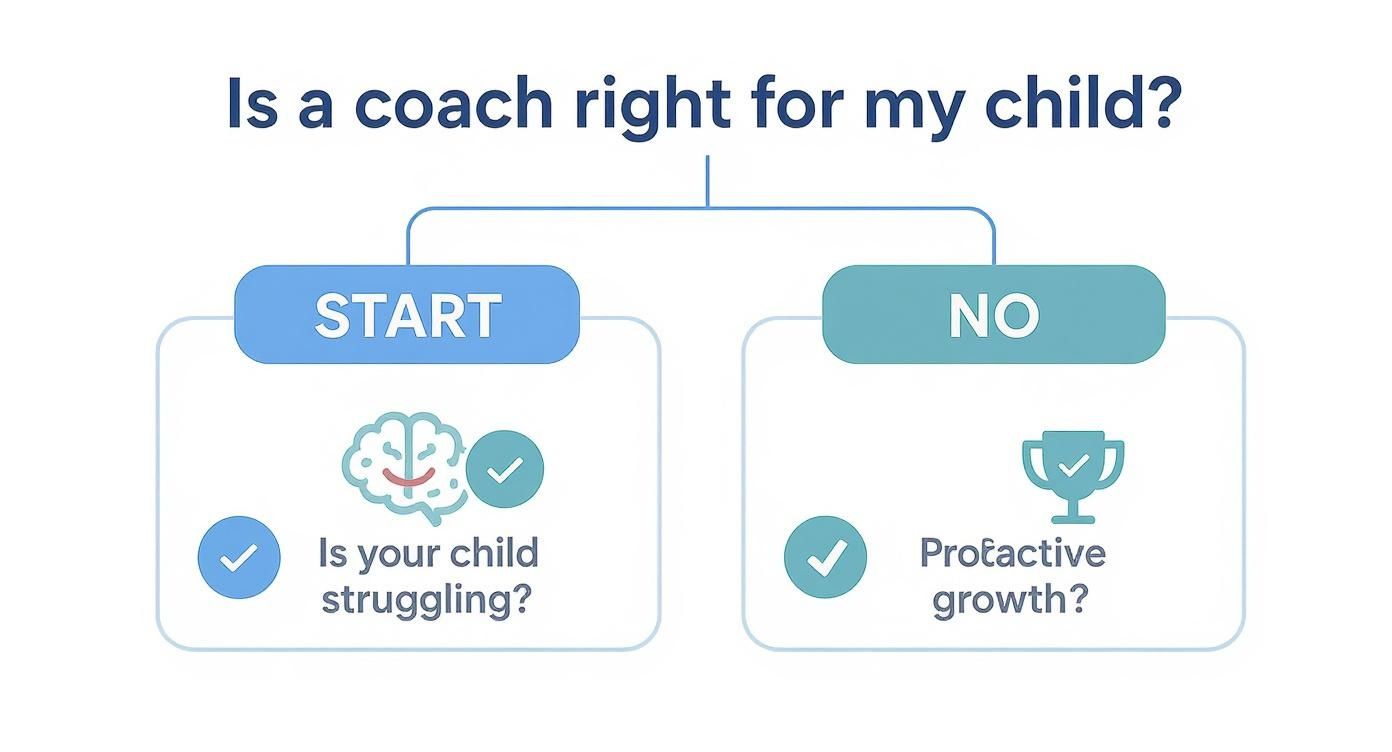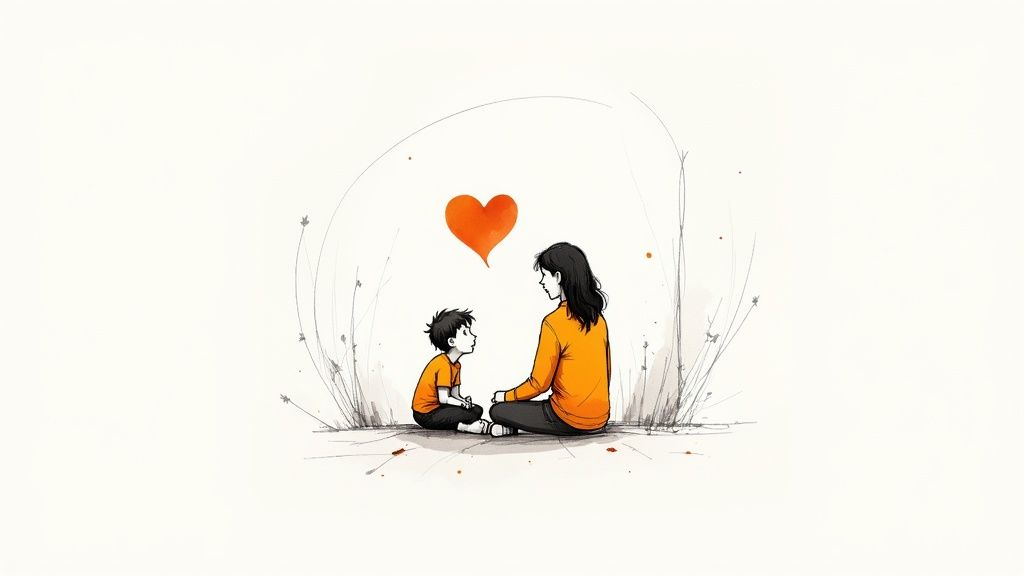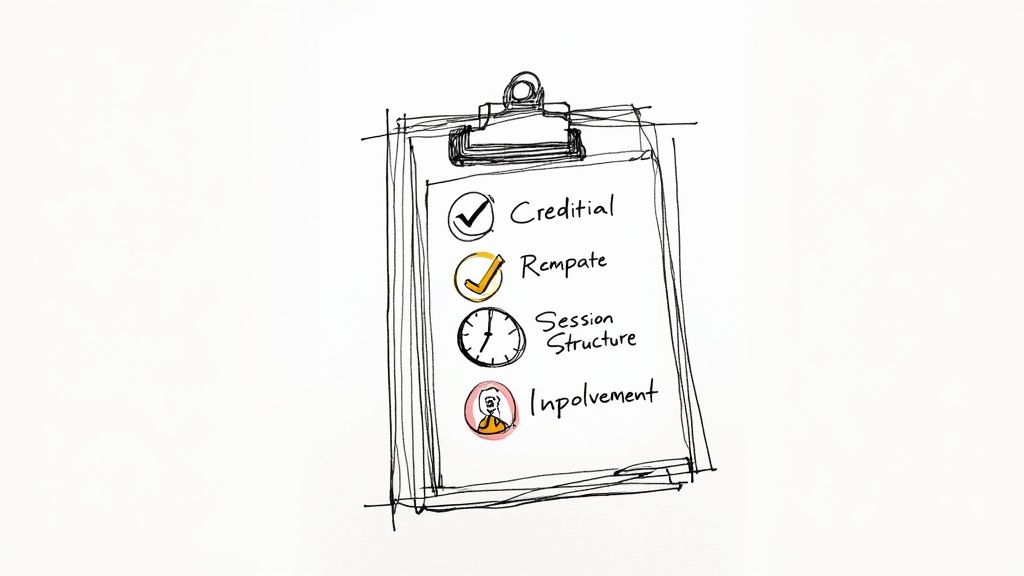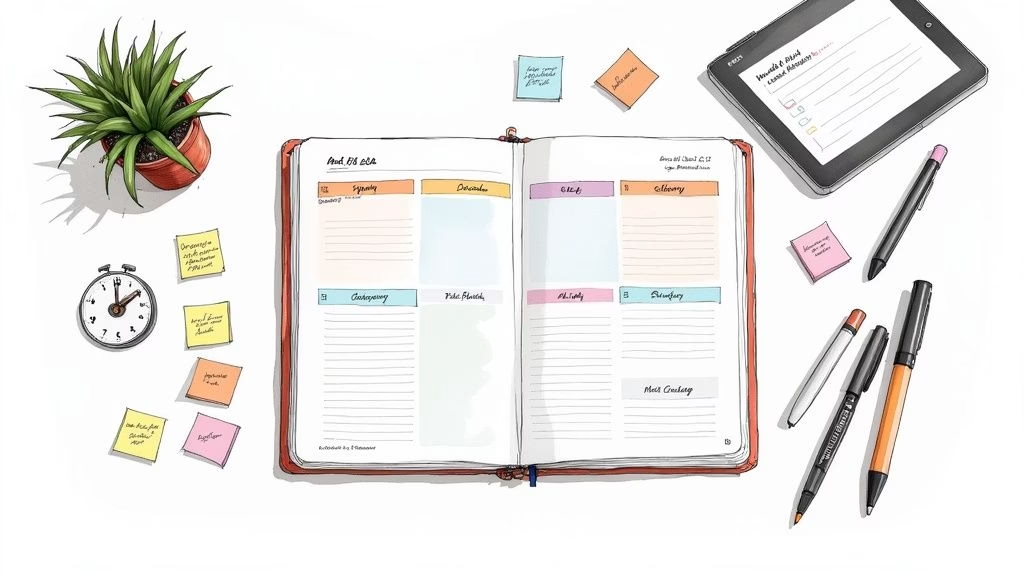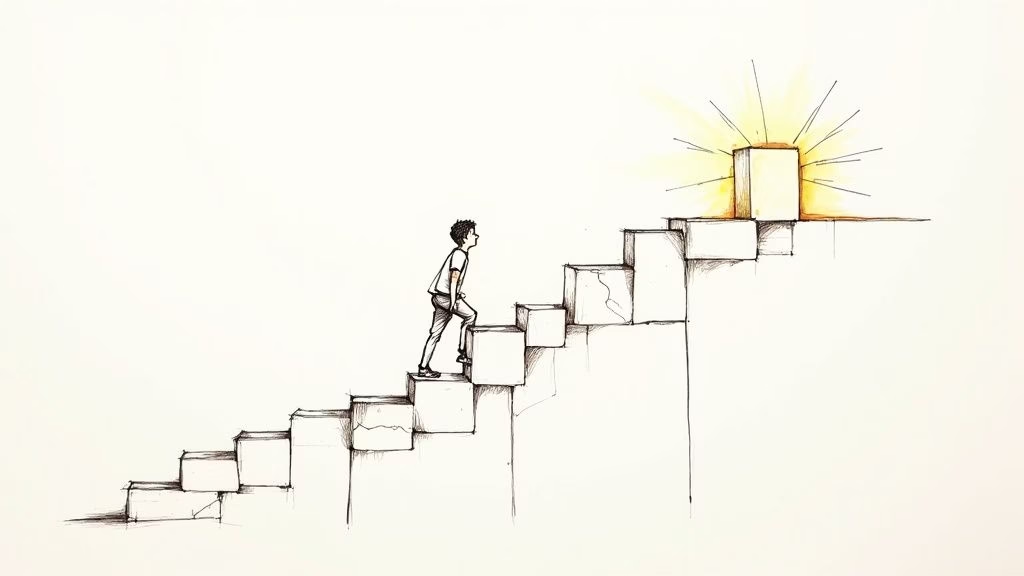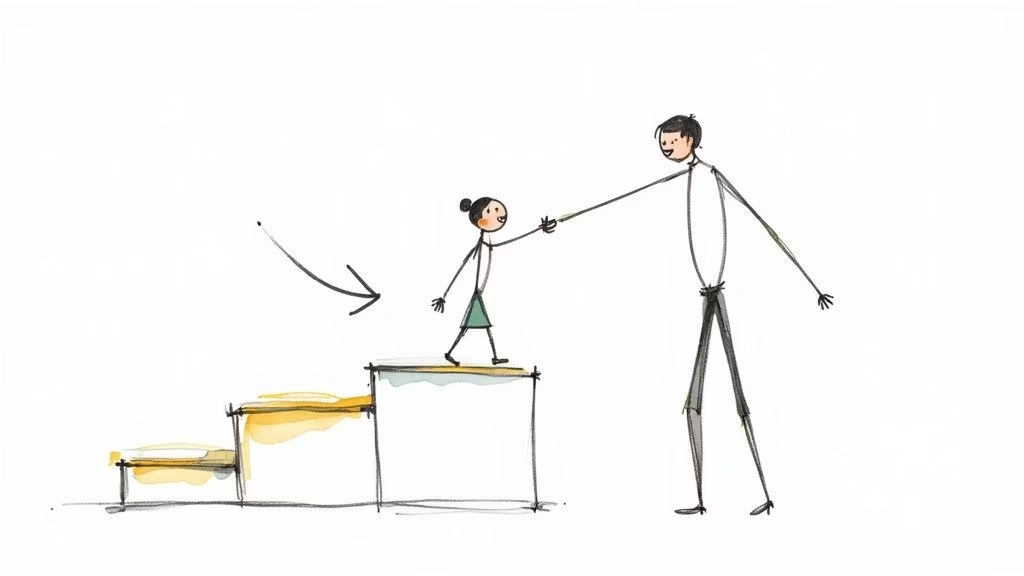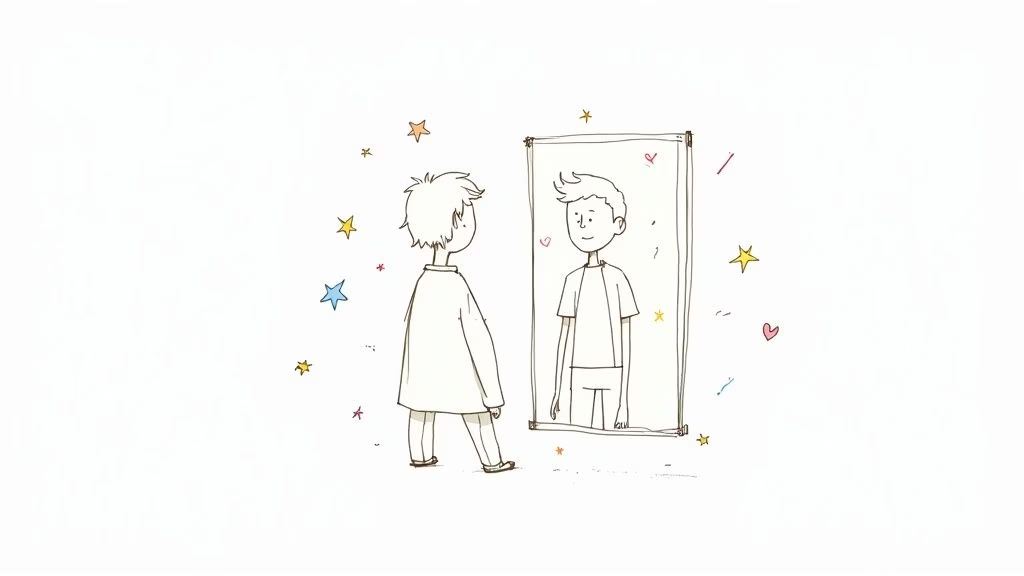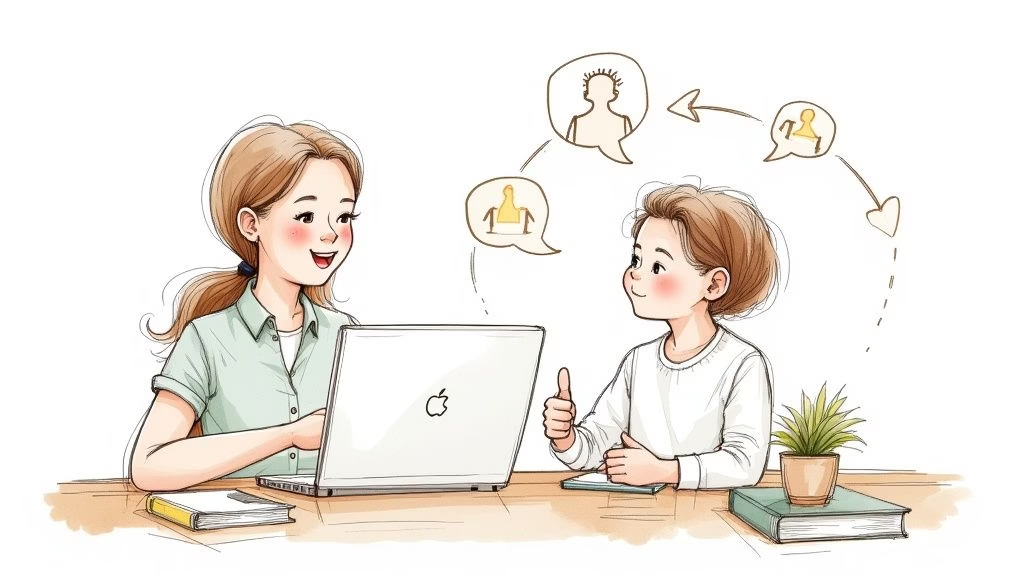So, what exactly is a life coach for kids? Think of them as a supportive mentor—someone who partners with your child to build confidence, navigate challenges, and turn their goals into actual achievements.
Instead of digging into past issues, a coach offers forward-looking guidance. Their job is to equip kids with practical life skills that will help them thrive, both in the classroom and long after they've graduated.
Understanding the Role of a Kids Life Coach
It helps to think of a life coach not as a therapist, but as a personal trainer for your child’s life skills. They’re like a sports coach for life's hurdles.
While a sports coach gets an athlete ready for the next big game, a life coach prepares a child for the opportunities and obstacles that lie ahead. Their main goal is to empower kids by helping them build resilience, sharpen their self-awareness, and develop a proactive, can-do mindset.
This whole approach is about building skills, not just putting out fires. A coach works side-by-side with your child to pinpoint their unique strengths, set goals that actually mean something to them, and then map out the steps to get there. It’s a process that helps them tackle common struggles like procrastination and low motivation by getting to the root of the issue and building better strategies from the ground up.
Key Roles of a Life Coach for Kids at a Glance
So, what does a coach actually do in practice? They wear a lot of hats, but their core mission is always to help your child become the most capable, confident version of themselves. Here's a quick look at their main focus areas.
| Focus Area | What It Means for Your Child |
|---|---|
| Confidence Building | Helping them see their own worth and what they're truly capable of achieving. |
| Goal Setting | Teaching them how to set realistic, meaningful goals and create a plan to reach them. |
| Emotional Regulation | Giving them simple, effective tools to understand and manage their feelings. |
| Motivation & School Performance | Working through procrastination and building study habits that actually stick. |
| Social Skills | Guiding them in navigating friendships, communication, and social dynamics. |
At the end of the day, it's all about empowering your child to take charge of their own journey.
What's the End Goal?
Ultimately, a great coach is working toward fostering self-directed learning and autonomy. This partnership builds a solid foundation for lifelong success, giving them the tools to handle everything from exam stress to tricky social situations.
The rise of life coaching for younger age groups isn't just a trend; it shows a real shift in understanding how important early personal development is. The life coaching industry was valued globally at around $4.56 billion and is expected to keep growing, which tells you just how much parents are seeking this kind of supportive guidance for their kids.
A life coach provides a safe, non-judgmental space for kids to explore their potential. They act as a guide, helping children find their own answers and build the self-assurance needed to navigate their world confidently.
A life coach is a true partner in your child's development. They offer personalized support to help them build a toolkit of essential life skills, making sure they feel prepared, capable, and ready to succeed on their own terms.
A Life Coach Is Not a Therapist
One of the most important things for parents to get is that a life coach isn't a therapist. It’s a crucial distinction. While both are dedicated to a child’s well-being, their roles, methods, and the ground they cover are fundamentally different. Confusing the two can mean your child ends up with the wrong kind of support for what they truly need.
Think of it this way: a therapist is like a doctor who diagnoses and heals an injury from the past. They're trained to work with diagnosed mental health conditions, help process trauma, and untangle deep-seated emotional and psychological challenges. Their work often looks backward to understand and heal what’s already happened.
A life coach, on the other hand, is like a personal strength trainer getting an athlete ready for the next big game. They're all about the future, partnering with your child to build skills, map out strategies, and cultivate a positive mindset for the road ahead. The goal isn't to diagnose; it’s to empower.
As we all pay more attention to mental health, life coaching for kids has emerged as a powerful, complementary approach. It’s not clinical counseling. Instead, it’s all about setting goals, finding motivation, and building confidence and emotional intelligence from the ground up.
When To Choose A Coach Vs. A Therapist
So, how do you know which path to take? It really comes down to what your child is facing right now.
Therapy is the right call for children dealing with significant anxiety, depression, trauma, or other diagnosed mental health conditions. A therapist provides clinical treatment within a medical framework, which is essential for healing.
Coaching is ideal for kids who are generally doing okay but need a boost to reach their full potential. This could mean help with overcoming procrastination, building self-esteem, improving social skills, or just finding their motivation again. A life coach for teens can be especially effective for navigating these common, but tricky, developmental hurdles.
This decision tree can help you see whether your child might benefit more from a proactive coach or a clinical therapist.
The key takeaway is this: therapy addresses healing from past or present clinical struggles, while coaching focuses on building skills for future growth.
Navigating the choice between a life coach and a therapist can feel confusing. Both professionals aim to support your child, but their approach and focus differ significantly. To help clarify, here's a side-by-side comparison.
Life Coach vs. Therapist: A Comparison for Parents
| Aspect | Life Coach | Therapist |
|---|---|---|
| Primary Focus | Forward-looking; goal-oriented; skill-building for the future. | Past and present-focused; healing emotional wounds and trauma. |
| Core Goal | Empowering the child to reach their full potential. | Diagnosing and treating mental health conditions. |
| Methodology | Partnership and guidance; building strategies and accountability. | Clinical treatment; psychotherapy within a medical framework. |
| Best For | Kids needing help with confidence, motivation, social skills, or goals. | Kids dealing with anxiety, depression, trauma, or diagnosed conditions. |
| Stance | A supportive partner and mentor. | A clinical expert providing professional treatment. |
Understanding these distinctions ensures you're choosing the right kind of support that aligns with your child's specific needs at this moment in their life.
A Partnership In Overall Wellness
Let me be clear: a life coach should never replace professional mental healthcare when it's needed. Instead, they can be a powerful part of a child's support system, helping them apply healthy habits in their day-to-day life.
Many of the strategies coaches use, like mindfulness and goal-setting, are fantastic for overall well-being. A coach can offer Health and Wellness Tips: Supporting Your Child's Development Beyond Therapy that reinforce positive growth outside of a clinical setting.
By understanding this clear distinction, you can make the best choice to support your child's unique journey.
Navigating School Stress and Procrastination
For a lot of kids, school feels less like a place of learning and more like a pressure cooker. Deadlines are always looming, expectations feel impossibly high, and the fear of falling behind is constant. In that environment, a life coach can be a game-changer, helping your child shift from feeling totally overwhelmed to feeling back in control.
Instead of just saying, "You need to stop procrastinating," a coach gets to the heart of the issue. They sit down with your child to figure out the why behind the avoidance. Is it a crippling fear of not getting a perfect grade? Are they just not connecting with the material? Or does a big project feel so massive that they just shut down?
Once you know the real reason, you can find a real solution. A coach provides specific, targeted strategies that build both skills and confidence, turning vague advice into small, doable steps.
From Avoidance to Action
A huge part of coaching is teaching kids how to break down intimidating tasks into bite-sized pieces. Imagine your teen staring at a 10-page research paper—it feels impossible. A coach helps them map it out: find five sources today, write the outline tomorrow, draft the intro the next day. Suddenly, the mountain becomes a series of small, climbable hills.
They also introduce practical time-management tools that actually work. One of my favorites is the Pomodoro Technique, where you work in focused 25-minute sprints followed by a short break. It’s not about forcing hours of concentration; it’s about proving to yourself that you can focus, one small block at a time. This builds momentum and makes it easier to get started next time.
"A coach helps your child see that procrastination isn't a character flaw—it's often a symptom of something else. By addressing the root cause, they can build lasting habits that replace avoidance with proactive, confident action."
Practical Tools and Support for Teens
The right support system is everything. Sometimes, procrastination is tangled up with bigger challenges around planning, organization, and follow-through. When that's the case, exploring executive function coaching can offer more specialized strategies to get things back on track.
To round out that support, here are a few resources I often recommend for teen mental health and motivation:
- The Jed Foundation (JED): This organization offers incredible resources and expert advice focused on protecting the emotional health of teens and young adults.
- Child Mind Institute: A go-to source for reliable, research-backed information on everything from teen mental health to learning disorders.
- Simple Meditation for Teens: Encourage your teen to try this. Just sit comfortably for 5 minutes, close your eyes, and focus on your breath. Inhale for four counts, exhale for six. It’s a simple practice that can make a huge difference in managing stress.
For teen boys who are struggling, finding the right kind of mentorship is key. Groups like The ManKind Project create communities that help young men build emotional intelligence and navigate modern pressures in a healthy way. When you combine coaching with resources like these, you create a powerful network of support.
Mentoring Teen Boys and Young Men
Let's be honest: being a teenage boy today is tough. They're navigating a minefield of academic stress, confusing social cues, and mixed messages about what it even means to be a man. Society often tells them to "man up" and keep their feelings to themselves, which leaves them trying to handle anxiety, self-doubt, and stress all alone.
This is where a life coach comes in. A coach can provide a confidential, judgment-free space for a young man to figure out who he is and, more importantly, who he wants to become.
Think of a coach as a positive male mentor who isn't a parent or a teacher. That unique dynamic makes all the difference. It gives a teen the freedom to open up about struggles with procrastination, motivation, or school performance without the fear of letting someone down. The goal isn't just to get better grades; it's to build a more resilient, confident, and whole person.
Building Emotional Intelligence and Resilience
A huge part of my coaching work is focused on developing emotional intelligence. So many young men are taught to bottle up their feelings, which almost always leads to unhealthy ways of coping down the road. I help them learn to identify, understand, and talk about their emotions in a constructive way—a skill that's absolutely essential for good mental health and building strong relationships.
This isn't just talk. We work on practical strategies for managing the real-world stress of school and life. For instance, I might introduce simple mindfulness or meditation techniques to help a teen learn to quiet a racing mind before a big test.
Beginner's Meditation Guide for Teens
It doesn't have to be complicated. Here's a simple way to start:
- Find a Quiet Spot: Sit comfortably in a chair for just 5 minutes. That's it.
- Focus on Your Breath: Close your eyes and take a slow breath in through your nose for a count of four.
- Breathe Out Slowly: Exhale through your mouth for a count of six.
- Stay in the Moment: Your mind will wander. That's normal. When it does, just gently bring your focus back to your breath.
Doing this simple exercise daily can make a massive difference in a teen's ability to focus and feel less overwhelmed.
Resources and a Wider Support System
Coaching is a powerful tool, but it works best when it's part of a bigger support network. For parents, just understanding the unique pressures your son is facing is a huge first step. Creating a home environment where it's safe to talk about feelings openly is one of the most important things you can do.
Beyond the family, connecting young men with positive communities can reinforce the work we do together. Organizations like The ManKind Project and Evryman offer men's groups and other resources that champion healthy masculinity and emotional connection. These communities are invaluable for teen boys that are struggling, offering them a space to see that vulnerability is a strength.
A life coach helps a young man build his own internal compass. They equip him with the tools to navigate challenges, set meaningful goals, and confidently define his own version of success, moving beyond societal expectations to find genuine purpose and motivation.
How to Find the Right Coach for Your Child
Choosing someone to guide your child is a massive decision. It gets even tougher when you realize just about anyone can call themselves a "life coach for kids." Unlike therapists or counselors, the coaching industry isn't heavily regulated, which puts the responsibility squarely on you, the parent, to do your homework.
A great coach is so much more than a tutor for motivation or schoolwork; they become a trusted mentor. You're looking for someone with the right background and experience, of course. But just as important is finding a personality that genuinely connects with your child. Without that real, authentic connection, the whole thing falls flat.
Vetting Potential Coaches
Start by looking for coaches who have a background in child development, education, or psychology. While a coaching certification isn't a legal must-have, it does show a real commitment to professional standards and ethics. The industry is booming—in North America alone, there are roughly 34,200 certified coaches, but their specialties and quality vary wildly. You can read more about the coaching industry and its earning potential on luisazhou.com.
When you get on the phone with a potential coach, don't be shy. Ask specific questions about their experience with your child's age group and the particular struggles they're facing, whether it's procrastination, social anxiety, or just a lack of direction.
A huge red flag? Any coach who promises a "quick fix" or starts blurring the lines with therapy. A trustworthy coach knows their job is to empower and guide, not to diagnose or treat a mental health condition.
Questions to Ask a Potential Coach
When you have that first consultation call, come prepared with a list of questions. Think of it less like an interview and more like a conversation to see if your values, goals, and expectations are on the same page. It’s all about finding the right fit and ensuring your child will be in good hands.
Use this checklist to get the conversation started:
- Can you tell me about your coaching philosophy? What's your general approach?
- How do you typically structure sessions with kids or teens?
- How will we track progress and know if this is working?
- What's your experience with challenges like [mention your child's specific issue, e.g., school motivation]?
- How do you keep parents in the loop while still respecting the child's privacy?
At the end of the day, one of the best parenting tips is to trust your gut. And just as importantly, involve your child in the process. Once you've narrowed it down to a couple of good options, let your child meet them or sit in on a call. Their buy-in is everything. If they don't feel comfortable, the coaching simply won't be effective.
A life coach can be an incredible partner in your child's journey, but they’re just one part of a much bigger support system. Building a positive environment at home and knowing where to find trusted information are just as critical. Think of this as your personal resource hub—a handpicked list of tools and organizations to help you support your teen’s mental health and well-being.
This isn’t just a list. It's a launchpad for creating a resilient, supportive world around your child. Knowledge is power, and these resources will equip you to be a proactive, informed advocate for your teen.
Trusted Organizations for Research and Support
When you need solid, expert-backed information on teen mental health, you have to go to the right sources. These organizations are leaders in the field, offering parents research, real-world advice, and a community that gets it.
- The Jed Foundation (JED) This non-profit is all about protecting emotional health and preventing suicide for teens and young adults. Their website is packed with guides on everything from how to start a tough conversation about mental health to spotting warning signs.
- Child Mind Institute As an independent non-profit, this organization delivers gold-standard, evidence-based care and shares its research for free. It’s an amazing resource for understanding specific challenges like anxiety, ADHD, and depression in kids and teens.
A Simple Meditation Guide for Teens
One of the most powerful things you can do to help a teen manage stress is introduce them to mindfulness. Meditation can sound intimidating, but it doesn't have to be complicated. Here's a simple, beginner-friendly guide to help your teen calm their mind, cut through anxiety, and find focus in just a few minutes a day.
Five-Minute Mindfulness Practice
- Find a Quiet Space: Sit in a chair where you can be comfortable, with your feet flat on the floor and your hands resting in your lap.
- Set a Timer: Start with just three to five minutes. The goal is to make it feel easy, not like another chore.
- Focus on Your Breath: Close your eyes. Take a slow breath in through your nose for a count of four, then let it out slowly through your mouth for a count of six.
- Acknowledge Wandering Thoughts: Your mind is going to wander. That’s what minds do. When it happens, just gently guide your focus back to your breathing without judging yourself.
This simple practice, when done consistently, teaches the brain to pause instead of panic. It’s a foundational skill a life coach often reinforces to help teens tackle everything from exam stress to social pressures.
Resources for Young Men and Teen Boys
For teen boys, finding positive role models and a safe place to talk about what’s really going on is a game-changer. So many guys struggle with the pressure to bottle up their feelings, which can tank their motivation and mental health. Connecting them with supportive communities can make all the difference.
Organizations like The ManKind Project and Evryman host men's groups and offer resources that encourage emotional intelligence and a healthier idea of masculinity. These communities show young men that strength is found in vulnerability and connection, which perfectly complements the work a life coach does to build self-awareness and resilience. This kind of multi-faceted approach ensures that teen boys who are struggling have more than one place to turn for support.
Common Questions Parents Ask About Life Coaching for Kids
When you're thinking about getting a life coach for your child, a lot of practical questions naturally come up. Getting clear on the details can help you figure out if it's the right move for your family and make sure you find a coach who's a great fit.
What’s the Right Age for a Kid to Start Life Coaching?
There's no single magic number, but most coaches start working with kids around eight or nine years old. At that age, they're usually able to start talking about goals and thinking a bit more abstractly.
That said, coaching really hits its stride with pre-teens and teenagers. This is when life gets complicated—social pressures, academic stress, and figuring out who they are. That's where a coach can make a huge impact.
How Long Will My Child Need a Coach?
This completely depends on your child and what they're working on. It’s not a one-size-fits-all thing.
Some kids just need a short-term boost for 3-6 months to get over a specific hurdle, like beating procrastination before a big exam season. For others, a longer-term partnership is more valuable, giving them consistent support as they build foundational skills like confidence and resilience that will stick with them for life.
Are the Coaching Sessions Confidential?
Absolutely. Trust is everything in a coaching relationship, and confidentiality is the bedrock of that trust.
With kids and teens, it works a little differently, of course. The coach sets up a clear three-way agreement from the start with both you and your child about what gets shared. You'll get general updates on their progress, but the nitty-gritty details of their conversations stay private. The only exception is if a coach has a real concern for your child's safety.
One of the best things you can do as a parent is to honor that private space. When your child knows they have a trusted person to talk to without fear of judgment (or having it all reported back), they’re more likely to open up, be honest, and truly take ownership of their own growth.
At Andrew Petrillo Life Coaching, my goal is to build that foundation of trust and create a real, actionable plan to help your teen conquer challenges and build a future they're excited about. If you see them struggling with school stress, a lack of motivation, or just feeling lost, a personalized coaching partnership can be a game-changer.
Learn more about my approach and let's chat in a complimentary discovery call.

